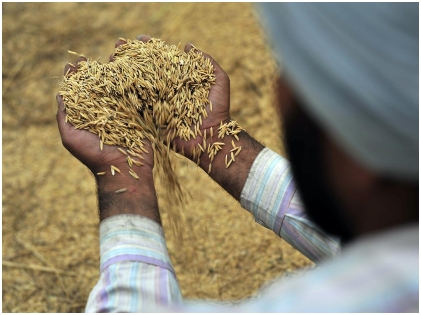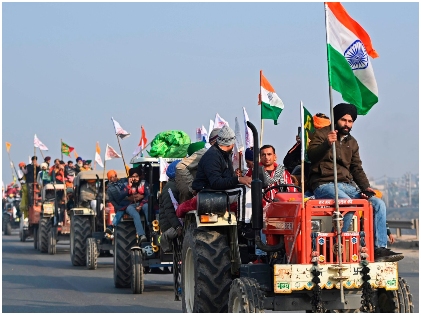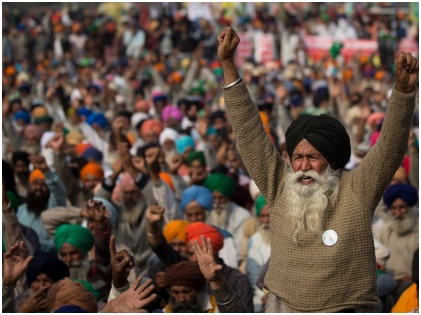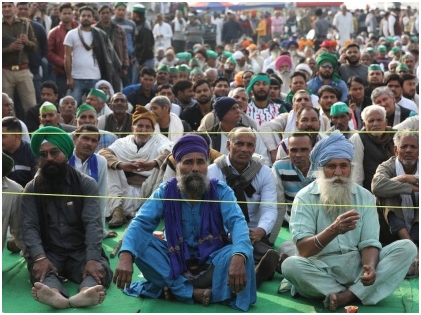A farmer’s protest is a unique socio-economic phenomenon in a country like India, where 60% of its 1.3 billion population depends on the agricultural sector for its livelihood. The long tractor rallies, thousands of furious farmers, riot police, tear gas, broken barricades, and a dispute over the new farmer’s law.
The protest has every firepower to garner global attention. So, before understanding what farmers want, we have to go through the set of three Farmers’ Produce Trade and Commerce laws passed in September.
The New Farm Laws
 India’s national capital New Delhi saw a farmers’ upheaval on January 26, Republic Day. The intense police-farmers battle on New Delhi’s streets was the extreme outcome of farmers’ demonstration against the newly passed farm laws. According to Prime Minister Narendra Modi, the new farm laws will deregulate India’s massive agricultural market to liberate the farmers. The government stated that these laws would eliminate middlemen’s oppression and help farmers sell their crops directly to private buyers.
India’s national capital New Delhi saw a farmers’ upheaval on January 26, Republic Day. The intense police-farmers battle on New Delhi’s streets was the extreme outcome of farmers’ demonstration against the newly passed farm laws. According to Prime Minister Narendra Modi, the new farm laws will deregulate India’s massive agricultural market to liberate the farmers. The government stated that these laws would eliminate middlemen’s oppression and help farmers sell their crops directly to private buyers.
These laws also mean that now the farmer can enter into contract farming, and traders can stockpile the food without the government’s interference. In other words, the new farm act could give the big corporations a free-hand to regulate the price of food and other commodities. Therefore, farmers fear that these corporate giants may have the authority to influence crops’ minimum support price without government regulation. Many fear that this will pave the way for increased debt, bankruptcy, and eventually farmers’ suicide.
The Bigger Concerns
 Well, farmers do have some genuine issues with the laws enacted by the central government. According to the union of farmers, the process of bypassing the government-regulated market will end up in a debacle in the long run. The government claims that they want to make the selling process of crops for the farmers. However, it will also encourage the big corporates to enforce their vehement prices in the future.
Well, farmers do have some genuine issues with the laws enacted by the central government. According to the union of farmers, the process of bypassing the government-regulated market will end up in a debacle in the long run. The government claims that they want to make the selling process of crops for the farmers. However, it will also encourage the big corporates to enforce their vehement prices in the future.
As most of India’s farmers are smallholder farmers, it is almost impossible for them to negotiate with private corporations. Leaving them at the mercy of corporate players could be suicidal. Farmers won’t get the price they want for their crops, not even the minimum price. So, as it stands, the newly liberated agriculture system will be beneficial for corporates, not farmers. Hence, the farmers take on the street in demand of complete repeal of the new farm laws.
Can the Disputes be Resolved at Court?
 According to a new legal provision, farmers can’t take the matter to the regular court for potential resolution. They have to seek the help of district-level authority like conciliation boards to resolve. We can understand that farmers’ suffering and their concerns are real and not something we can overlook. Without adequate legal protection, big private corporations can easily bother small farmers.
According to a new legal provision, farmers can’t take the matter to the regular court for potential resolution. They have to seek the help of district-level authority like conciliation boards to resolve. We can understand that farmers’ suffering and their concerns are real and not something we can overlook. Without adequate legal protection, big private corporations can easily bother small farmers.
Minimum Support Price or MSP
 The minimum support price is the backbone of this entire selling process. After India’s crop failures of the 1960s, MSP played a pivotal role in ending the past’s agricultural calamity. It means farmers get the regulated minimum price for their crops, facilitating fair treatment towards them.
The minimum support price is the backbone of this entire selling process. After India’s crop failures of the 1960s, MSP played a pivotal role in ending the past’s agricultural calamity. It means farmers get the regulated minimum price for their crops, facilitating fair treatment towards them.
But the latest laws don’t guarantee any MSP, and without it, the prices of farmers’ produced crops can dip significantly, leading to losses. A written assurance or legal safeguard on MSP might improve the situation. However, the Indian government has failed to do so.
Bills Passed In September 2020
 The government passed the newly liberated farm law in September 2020, and farmers are protesting ever since. But, no international media tried to bat an eye at that time. When the rage becomes intense with time to spread like wildfire, it becomes an international headline. The law enforcement took place under an emergency ordinance during the coronavirus pandemic’s peak period and later passed in Parliament. The worst part is all happened overnight without the consultation of farmers.
The government passed the newly liberated farm law in September 2020, and farmers are protesting ever since. But, no international media tried to bat an eye at that time. When the rage becomes intense with time to spread like wildfire, it becomes an international headline. The law enforcement took place under an emergency ordinance during the coronavirus pandemic’s peak period and later passed in Parliament. The worst part is all happened overnight without the consultation of farmers.
The Indian government wants to implement it anyhow. Although the government and farmers’ unions have held multiple talks among them, it is of no avail. The prime minister has been reiterating the same words that this law is for the betterment of farmers only, but the farmers think otherwise.
But we believe that things could take a positive turn with global leaders and celebrities taking to social media to support the farmers. Have you heard about this issue yet? Do share your thoughts in the comments section!





